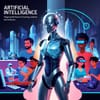Artificial intelligence (AI) is transforming the world by revolutionizing industries, reshaping economies, and raising profound ethical questions. AI is being used in various fields, including healthcare, education, transportation, and entertainment. In healthcare, AI-powered tools analyze medical images, predict disease outbreaks, and assist in drug discovery. For instance, AI can help doctors detect diseases like cancer earlier and more accurately by analyzing medical images.
In education, adaptive learning platforms use AI to personalize lessons for students, making education more engaging and effective. AI tutors and smart assessments improve education worldwide. Self-driving cars and smart traffic systems reduce accidents and travel time, while AI navigation systems optimize traffic flow by predicting congestion and suggesting alternative routes.
AI's benefits are numerous, including increased efficiency, cost savings, and innovation. AI performs tasks faster and more accurately than humans, saving time and labor costs. Additionally, AI opens doors for new inventions and discoveries.
However, AI also raises concerns about job displacement, bias, and privacy risks. Automation could replace certain jobs, particularly those involving repetitive tasks, but AI also creates new job opportunities in fields like AI development and data science. Ensuring AI systems are trained on diverse and unbiased data is crucial to prevent perpetuating biases and discrimination. Furthermore, AI-driven data collection raises concerns over surveillance and data security.
As AI continues to advance, it's likely to lead to increased automation, human-AI collaboration, and innovations in various fields. Governments and institutions are implementing ethical guidelines to ensure responsible AI development and use. By harnessing the power of AI, we can create a better future for all, but it's essential to address the challenges and concerns associated with its development and deployment.


